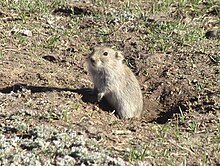Brandt's vole
| Brandt's Vole | |
|---|---|

| |
| Scientific classification | |
| Kingdom: | |
| Phylum: | |
| Class: | |
| Order: | |
| Family: | |
| Genus: | |
| Species: | L. brandtii
|
| Binomial name | |
| Lasiopodomys brandtii (Radde, 1861)
| |
| Synonyms | |
|
L. aga (Kastschenko, 1912) | |
Brandt's vole, (Lasiopodomys brandtii), also known as the steppe vole, is a species of rodent in the family Cricetidae. It is found in China, Mongolia and Russia.
Morphology
Brandt's vole is about 15 centimetres (6 inches) long with a tail up to 3.5 centimetres long. Its ears are small and the short fur is uniform sandy-brown, paler underneath. The tail is entirely brown and there are dense hairs on the hind part of the feet.[3]
Distribution and habitat
Brandt's vole is found in Nei Mongol, Jilin, and Hebei provinces in north-east China,[2] in Mongolia and southern Transbaikalia in Russia. Its habitat is dry steppes and pastures and it is sometimes also found in lakeside meadows and river valleys.[3]
Ecology
Brandt's vole is a colonial species. Each family establishes a network of burrows with several entrances, long passages, storerooms and nesting chambers. The voles are active during both the day and night and their behaviour varies at different times of year.[4] They feed on both the underground and aerial parts of plants. Large stores of food are laid up before the winter and the energy intake of the voles seems to be correlated with the length of day.[5] There are four or five broods each year, with each litter consisting of about seven young. Population levels are subject to wide swings. Under unfavourable conditions, this vole can be wiped out of some of the regions in which it is normally found, but when the conditions are right, mass outbreaks can occur. This periodically happens in Mongolia when millions of hectares of pasture are invaded. Under this onslaught, the pastures can become very bare, poor subsoil can be brought to the surface by burrowing activities and coarse weeds can become established, seriously harming the grazing for domestic animals.[3]
References
- ^ Template:IUCN2008 Database entry includes a brief justification of why this species is of least concern.
- ^ a b Mammal Species of the World
- ^ a b c AgroAtlas
- ^ Seasonal changes of the activity patterns of Brandt’s vole (Lasiopodomys brandtii) in the typical steppe in Inner Mongolia
- ^ Short photoperiod influences energy intake and serum leptin level in Brandt’s voles (Microtus brandtii)
- Musser, G. G. and M. D. Carleton. 2005. Superfamily Muroidea. pp. 894–1531 in Mammal Species of the World a Taxonomic and Geographic Reference. D. E. Wilson and D. M. Reeder eds. Johns Hopkins University Press, Baltimore.

